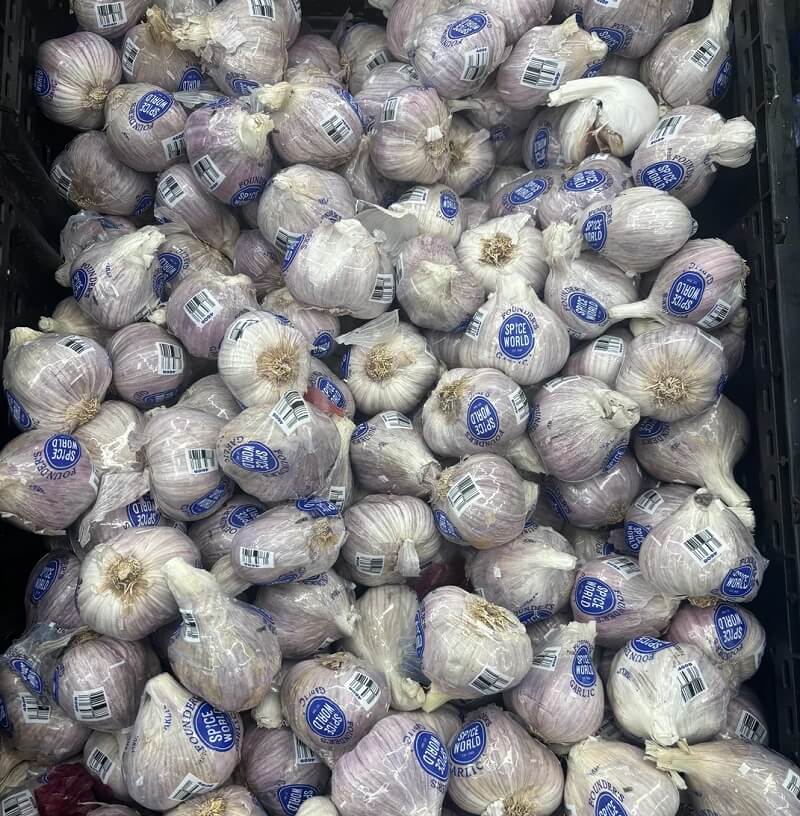It's hard to find anything in grocery stores that isn't wrapped in plastic — and that goes for fruits and vegetables that already have packaging courtesy of Mother Nature.
After visiting a Walmart in Idaho, one shopper shared their frustration with the r/Anticonsumption community upon finding individual garlic heads wrapped in plastic.

What's happening?
The post does not provide much context other than a photo of dozens of plastic-covered loose garlic heads supplied by Spice World for sale at the retail giant.
The Reddit user captioned the photo: "How to stop this?"
While most commenters acknowledged that plastic waste is a major problem, many noted that companies often wrap individual fruits and veggies in plastic to keep them fresh longer and reduce food waste, which is also a global issue.
Someone else said: "Simply don't buy the food wrapped in plastic is probably the best thing you can do."
"Sometimes I really wonder how people even come up with such ideas," another shared.
Why are plastic-wrapped garlic bulbs concerning?
The plastic-encased garlic is a problem for several reasons. While it may help cut down on food waste, saving consumers money, the chemicals in plastic can leach into food and water, presenting health hazards for humans.
Considering that the world produces over 440 million tons of plastic per year, and most of these materials end up in landfills, oceans, or other natural areas, the plastic covering the garlic will likely just contribute to plastic pollution.
In fact, the UN Environment Programme notes that around 36% of all plastics produced are for packaging — including for single-use products such as foods and drinks — but about 85% end their life cycle in landfills or as unregulated waste.
Plastic waste not only releases toxic planet-warming gases when it decomposes in landfills, but also leeches dangerous chemicals into the environment that can harm wildlife, soil, and water. And if the plastic ends up in the ocean, marine animals may become entangled or choke on it.
The plastics industry is responsible for around 3-4% of global pollution, and this could triple by 2050, per the Ocean Conservancy.
Is Walmart doing anything about this?
According to Walmart's website, the company is taking significant steps to tackle plastic waste across its supply chain. It's working with its suppliers to cut down on packaging waste and design recyclable packaging. By 2025, it aims to achieve fully recyclable or compostable packaging for its house label and provide recycling instructions on products for consumers.
Walmart also started offering collection bins for plastic items in its U.S. stores in 2021 and launched the "Beyond the Bag" initiative in 2020 to explore alternatives to plastic retail shopping bags. It has deployed Community Recycling Units at certain Walmart and Sam's Club locations as well, where customers can drop off items containing aluminum and some types of plastic.
That means plastic-wrapped garlic could be a thing of the past soon.
What's being done about plastic waste more broadly?
Many scientists and companies worldwide are working hard to find alternatives to plastic. For example, Apeel Sciences is making a plastic-free, edible coating for fruits and veggies, and Aldi is introducing sustainable packaging for its butter products. Seaweed packaging could even become a reality soon, thanks to the packaging startup Sway.
We can also make a dent in plastic pollution by opting for sustainable alternatives for plastic products, such as reusable water bottles and grocery bags, and educating ourselves about recycling opportunities in our cities.
Join our free newsletter for cool news and actionable info that makes it easy to help yourself while helping the planet.









